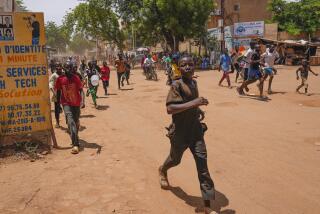Liberian Threatens to Attack U.S. Force : Africa: Rebel leader warns Marines. West Africans plan to send a contingent in bid to halt war.
- Share via
NAIROBI, Kenya — Prince Johnson, one of two rebel leaders besieging the capital of Liberia, threatened Tuesday to attack a detachment of U.S. Marines unless the United States or another foreign country intervenes to halt the Liberian civil war.
At the same time, a group of West African countries announced that they will send a joint military force into Liberia in an effort to end the conflict and set up an interim government.
There was no indication of when the multilateral force will be organized.
The announcement of West African intervention came at the end of a two-day meeting in Banjul, Gambia, attended by the leaders of Guinea and Sierra Leone, which border on Liberia, and Ghana and Nigeria, which have had close ties with Liberia. Many Ghanaian and Nigerian citizens work and do business there.
Johnson issued his threat against the Marines, which was interpreted as an attempt to provoke foreign intervention, at a news conference in Monrovia, the Liberian capital, where he and a rival rebel leader are trying to oust the government of President Samuel K. Doe.
About 200 Marines were put ashore at Monrovia on Sunday to oversee the evacuation of U.S. and other foreign nationals wishing to leave the war-torn capital. The Marines are under orders not to get involved in the fighting.
At the news conference in Monrovia, Johnson presented eight of the foreigners seized Monday at the Hotel Africa on the outskirts of Monrovia, including an American identified as Chris Mendes, 27, a mining engineer from Sacramento. The others were three Britons, two Germans, a Dutchman and an Argentine.
Johnson has pledged not to harm them but said he would hold them until an outside force arrived to settle the civil war.
There was some question about the total number of hostages. U.S. officials in Washington put the figure at 14 or 15, but in London the British Foreign Office said it was 16. Late Tuesday, the Associated Press reported more had been taken, raising the number to 22.
Johnson also announced that he had executed a Liberian senator, Fred J. Blay, for espionage on Sunday and is planning to shoot Congressman William Jabrah on the same charge. Jabrah was brought to the news conference with his hands bound.
Also present at the West Africa meeting was Secretary General Salim Ahmed Salim of the Organization of African Unity. The OAU charter prohibits African countries from interfering in one another’s internal affairs, but in this case the OAU has endorsed the move.
The West African force reportedly will be commanded by a Ghanaian officer with a Guinean deputy. Nigeria, the dominant military and economic power in West Africa, is expected to provide most of the troops.
President Ibrahim Babangida of Nigeria has been friendly toward President Samuel K. Doe of Liberia, and this has caused concern that a Nigerian-led force might not have the credibility needed to disarm the two rebel groups and instill confidence in the Liberian people that Doe will go.
The West African task force, according to sources reporting from Banjul, will consist of troops from Ghana, Guinea, Sierra Leone and Gambia as well as Nigeria. It will include an overland party setting out from Sierra Leone, which is situated on Liberia’s western border, and a largely Nigerian naval party.
For a brief time Tuesday, it appeared that the intervention would have the support of all three warring parties in Monrovia: Doe, Johnson and Charles Taylor, leader of the larger rebel group, the so-called National Patriotic Front.
Taylor spokesman Tom Woewiyu indicated in Banjul before the summit meeting that he might support the intervention if he were satisfied that its mission would be only to police a cease-fire. But on leaving the meeting, he said, “We do not think military intervention will solve the problem.”
The West African task force would be one of a very short list of military interventions in African countries since the period of independence after World War II. In 1981, the OAU made an abortive attempt with 5,000 men from Nigeria and Zaire to impose a cease-fire between the government and rebels in Chad. They failed to enforce the cease-fire and withdrew.
In 1979, Tanzania’s President Julius K. Nyerere sent troops into Uganda to oust President Idi Amin and install Milton Obote for his second term as leader of Uganda. But by then Ugandan forces had invaded Tanzania and bombed a border town. As it happened, Obote’s second term proved even more repressive and violent than Amin’s reign, and he was deposed in 1985 by Lt. Col. Tito Okello, who was overthrown the next year.
The West African leaders who met in Banjul under the auspices of the 16-nation Economic Community of West African States (ECOWAS), which is modeled on the European Community, said in a communique that “the sole purpose of the . . . peacekeeping force is to create the necessary conditions for normal life to resume to the benefit of all Liberians.”
The Liberian civil war began last Christmas Eve when Taylor, a former member of Doe’s Cabinet who fell out with the president and later received arms and training from Libya, invaded from Ivory Coast with 200 men.
Since reaching Monrovia, Taylor has declared himself head of an interim government, but has given no indication that he plans to restore democratic rule. The West African task force, if successful, would bar him from power along with Johnson and Doe.
More to Read
Sign up for Essential California
The most important California stories and recommendations in your inbox every morning.
You may occasionally receive promotional content from the Los Angeles Times.








